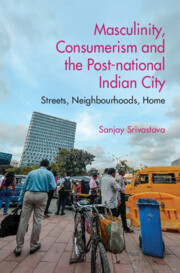Book contents
- Frontmatter
- Dedication
- Contents
- List of Figures
- Acknowledgements
- 1 Introduction: Masculinity, Modernity, Urbanity
- 2 Nationalism, Masculinity and the City
- 3 Dislocated Masculinities and the Unofficial City
- 4 Thrilling Affects: Sexuality, Masculinity, the City and ‘Indian Traditions’ in the Contemporary Hindi ‘Detective’ Novel
- 5 Fragmentary Pleasures: Masculinity, Urban Spaces and the Commodity Politics of ‘Religious Fundamentalists’
- 6 Technotopias: Masculinity, Women, the City and the Post-national Condition
- 7 Conclusion: Masculine Body Politics
- Bibliography
- Index
7 - Conclusion: Masculine Body Politics
Published online by Cambridge University Press: 06 September 2022
- Frontmatter
- Dedication
- Contents
- List of Figures
- Acknowledgements
- 1 Introduction: Masculinity, Modernity, Urbanity
- 2 Nationalism, Masculinity and the City
- 3 Dislocated Masculinities and the Unofficial City
- 4 Thrilling Affects: Sexuality, Masculinity, the City and ‘Indian Traditions’ in the Contemporary Hindi ‘Detective’ Novel
- 5 Fragmentary Pleasures: Masculinity, Urban Spaces and the Commodity Politics of ‘Religious Fundamentalists’
- 6 Technotopias: Masculinity, Women, the City and the Post-national Condition
- 7 Conclusion: Masculine Body Politics
- Bibliography
- Index
Summary
Introduction
Cultures of the city, the previous chapters have suggested, have been the contexts of the making of a masculine national culture (Chapter 2) as well as the anxieties regarding the imagined threats to it (Chapters 3–6). The city is a place of the double bind: it is both desired and feared. And masculinity-in-the-city consists of different strategies of being a man who is not just in the city but able to exert control over its processes. This self is, as I have argued, the forceful agent of encompassment, seeking dominion over many different realms, including the home, the neighbourhood and wider public spaces, religious identity and the world of goods.
The gender politics of Indian modernity has primarily been traced through the exploration of the discourses surrounding women. The female body and feminine chastity have had significant careers within feminist historiography as well as sociological and anthropological studies that seek to track the complex contours of power in the making of sociality. India-related scholarship has produced a rich body of work relating to topics as diverse as women as repositories of Indian traditions (Chatterjee 1993a; Mani 1993; Sunder Rajan 1993), the nation as a goddess (Ramaswamy 2010), televisual femininity (Mankekar 1999; Munshi 2010), women and Hindu nationalism (Bacchetta 2004; U. Chakravarty 1998; Sarkar and Butalia 1995) and women and new middle-class identities (Donner 2011; Ponniah 2018; Bhandari 2020). This book has sought to utilise these frameworks of analysis towards a different end: an analysis of the entanglements between urban and masculine cultures.
This chapter brings together many of the themes cited above – which have also informed the discussion of the book – to explore how abstract ideas about society and culture take concrete human form and influence action. The chapter suggests that the 2014 Indian general election constitutes a rich context for thinking about the ways in which various dispersed popular discourses on masculinity came together. The deployment of discourses of masculinity as a significant electoral strategy was unprecedented, as was the role of the media. The imbrication of these two contexts produced a vision of an actual man-of-the-city figure – one that has been explored in the earlier chapters – that has significant lessons for the ways in which we understand the Indian present.
- Type
- Chapter
- Information
- Masculinity, Consumerism and the Post-National Indian CityStreets, Neighbourhoods, Home, pp. 146 - 160Publisher: Cambridge University PressPrint publication year: 2023



